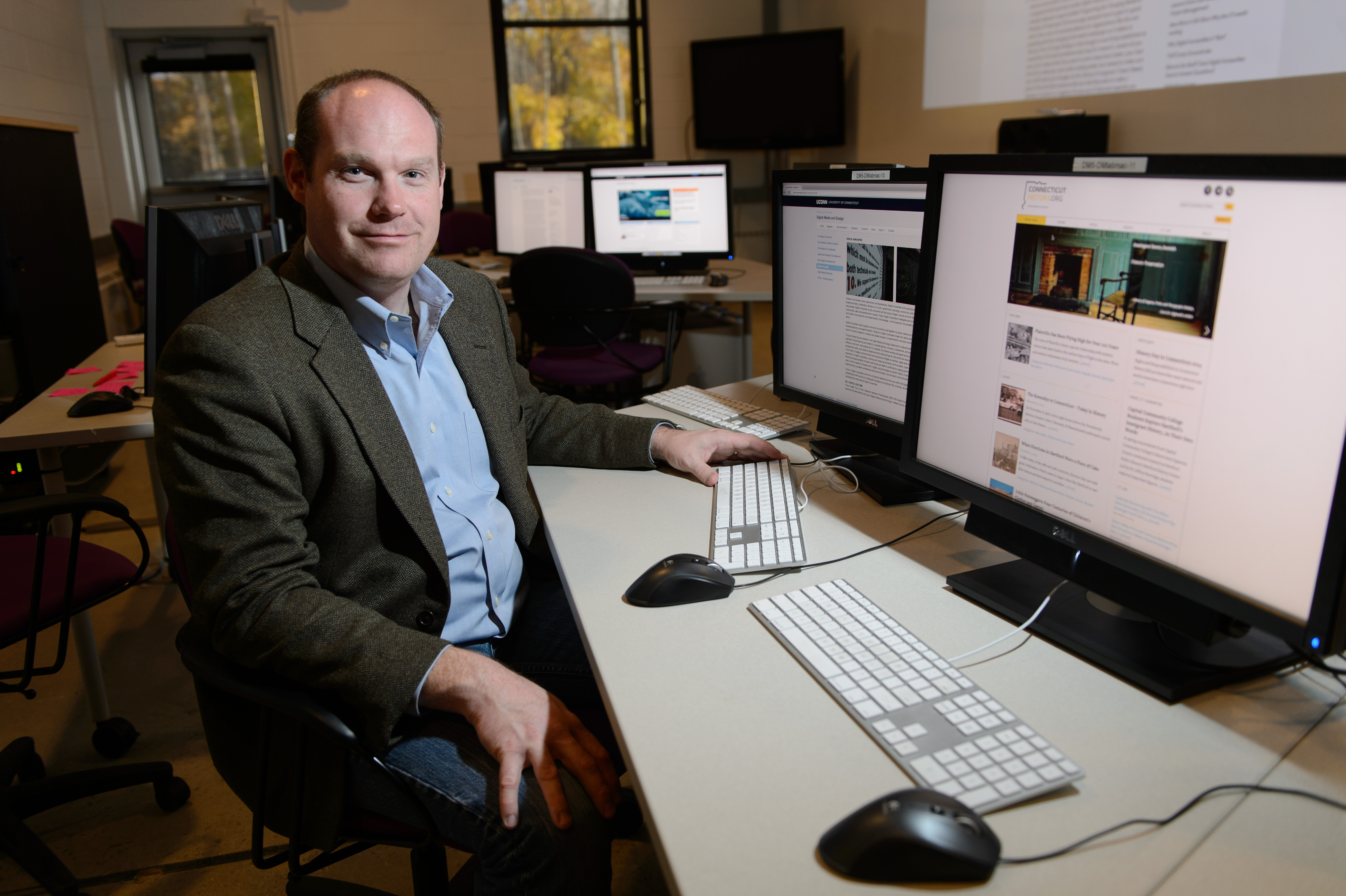A grant from the Andrew W. Mellon Foundation will help to expand digital scholarship at UConn with the establishment of a Scholarly Communications Design Studio. The award is part of the Mellon Foundation’s digital publishing initiative, a multi-pronged effort to support and accelerate the evolution of academic publishing in the Internet age.
The start-up funding of $99,000 will bring together a collaboration among the Digital Media & Design Department in the School of Fine Arts, the University Libraries, and the Humanities Institute that will make a systematic intervention into the ways scholarship is researched, authored, presented, and published in the digital age.
The Scholarly Communications Design Studio will draw insight from the design disciplines to create, implement, assess, and disseminate a sustainable, collaboration-first scholarly communications process suited to an evolving publishing landscape, according to Tom Scheinfeldt, associate professor of digital media and design and director of digital humanities in the Digital Media Center, who will lead the effort to develop the new studio.
“All too often, collaborators are brought on board to implement scholarly projects, not imagine them,” says Scheinfeldt, who previously helped lead the Roy Rosenzweig Center for History and New Media at George Mason University. “UConn’s new studio aims to change this by pushing collaboration on traditional as well as digital scholarship upstream in the research and publication workflow, to the very headwaters of inquiry, imagination, and project conception. This ‘collaboration first’ approach will bring scholars together with designers, developers, editors, and librarians to start new projects, not merely to finish them.”
Faculty and staff who will be involved in developing the studio include Clarissa Ceglio, research assistant in the Digital Media Center; Greg Colati, assistant university librarian for Archives, Special Collections, and Digital Curation; Brendan Kane, associate professor of history and associate director of the UConn Humanities Institute; and Samantha Olschan, assistant professor-in-residence in the Department of Digital Media and Design.
Scheinfeldt says “design thinking” models have been used in creative industries from Hollywood film-making to Madison Avenue advertising, to solve problems of complexity and scale similar to those faced by scholarly publishing.
“We believe that similar problems in academic publishing can be addressed by a design-oriented approach tailored to the needs of scholarly communication,” says Ceglio, the studio’s research coordinator and editorial faculty-member-in-residence. “During the planning period we propose to spend considerable time surveying the field of digital publishing at university presses, scholarly associations, and research libraries to help us better understand the varied terrain of digital publication efforts and capabilities.”
Following the survey of digital publishing, the planning group will develop a design process document outlining what will be needed to develop the Scholarly Communications Design Studio, establish an operational structure within Homer D. Babbidge Library, and create a refined sustainability plan for the studio.
“The Scholarly Communications Design Studio is a strategic development for the University,” says Mun Choi, provost and executive vice president for academic affairs. “Not only will the studio constitute an innovation in its own right, it will further UConn’s academic vision by promoting collaboration across disciplines and contributing to the communication of breakthrough ideas. With this award from the Mellon Foundation’s Scholarly Communications program, UConn will set the foundations for long-term contributions to the ways in which knowledge is communicated and shared in our digital age.”
Founded in 1969, the Andrew W. Mellon Foundation endeavors to strengthen, promote, and, where necessary, defend the contributions of the humanities and the arts to human flourishing and to the well-being of diverse and democratic societies by supporting exemplary institutions of higher education and culture as they renew and provide access to an invaluable heritage of ambitious, path-breaking work.



